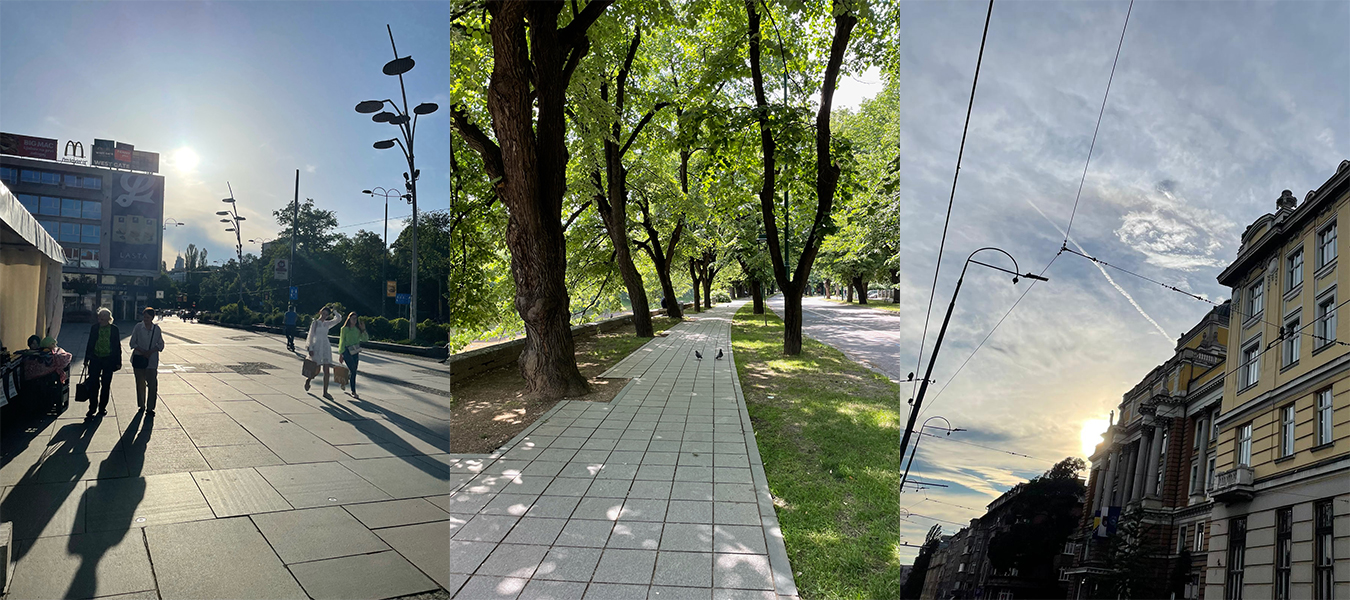
Jude walked with me to Begova Džamija. He kissed my cheeks politely near the entrance to the secret pekara and gave me a hug. That was it. “Thank you,” he said. Then he turned me around by the shoulders. “Now hurry.”
At BBI I cut over to the river, passing the café patio at Smoje, and went right, heading west against the one-way traffic. Striding. Striding high there. Like Hopkins’s kingdom of daylight’s dauphin… ecstasy! Away from the massive Austro-Hungarian edifice that was the post office. Down to the Eiffel bridge. Jaywalking across the multi-lane road, always a tricky business, because a turn light released cars from a side street, and usually they came rushing out, and you had to be fast, plus there was the tram to contend with in the right-hand lane. I always made a sport of this crossing, and tonight I didn’t care, because by now, I had been walking at a clipped pace for a while, so I was warm and loose from the wine and could feel the strength in my body and, even with the letdown about Jude, his wooden goodbye, the way he’d leaned toward that woman and touched her as he accepted a light, even with that, I couldn’t remember feeling so good in a long time.
I crossed the bridge, tiptoeing over the cobblestones, to the Skenderija side; then I waited at another light and scuttled through the intersection, preparing to begin the middle leg of the journey, middle age, the industrial stretch, that unattractive piece of the walk, the blown-out warehouses on the opposite side of the river, and behind them, the dark sky and stars, seen through the gaping window holes, and also Avaz tower, “that propaganda place,” Roba called it, for the Avaz owner also owned one of the three newspapers Roba claimed he had to read daily to understand what was going on in the country, and now I was striding / High there … the achieve of; the mastery of the thing!, walking along and hearing “The Windhover” rhythm, Hopkins, the person behind those words, and as I passed the trolleybus station, weaving through the forest of smokers waiting, weaving through them very fast, for I didn’t want to break my pace and have to pick it up again, just then, I heard someone call.
“Hello, hello!”
A man in the smoking forest. Wearing a small fedora and trench coat. Gripping a case. His shoulders forward. Calling to me.
“Hey,” he said, approaching. He was older. I didn’t know him. But he gestured as if to beckon me to him.
I smiled but picked up my pace and continued along the Miljacka.
When I got to the Vrbanja Bridge, I decided to take Vilsonovo—or, the Grbavica riverwalk opposite Vilsonovo; it was all Vilsonovo to me. The path, though lit, was very dim at night. Usually, if I saw the silhouettes of other walkers up ahead, then I would follow. If the way was deserted, I might go via the streets, though that way, too, was dark in spots and longer, and I would miss hearing the eddies and seeing the yellow lights reflected in the river. Now Vilsonovo was empty, but I really was quite late getting home and I wanted to be close to the water, so I entered the path, but carefully, as if entering a wood.
In the quiet dark, the river sounded an unusual power—as if an enormous volume of water were rushing down the small, manmade drops. Across the water—its fierce, relentless rush—I could see the lit-up blue sign on Importanne Centar and, further down, the blue lettering at the top of Hotel Bristol. Somewhere beyond it, on my side, was Grbavica Stadium, and I pictured those men taking the Željo papers from the chairs and Roba running in the street, and then I thought of the writer of the stadium lament, standing at Hotel Bristol, gazing.
I moved swiftly through the pools of dark near the children’s playground and behind the mosque, swiftly, listening for something, the crackling of sticks, and kept on till I came to the small garden under a light that marked the turn-off for our yard. A garden planted beside a mountain-scene mural on the sidewall of a garage. The scarecrow stood among the unblooming rosebushes—an upright tree trunk in a ravaged blazer, wearing its single ping-pong ball for an eye and a fedora, split on top, the tree poking through. Behind it, in the distance, the flashing blue-and-green sign over the pekara door. I took off toward it, running.
~
This passage was also published as part of a longer excerpt in the Bosnian journal Strane, translated into Bosnian/Croatian/Serbian by Mirza Purić.




